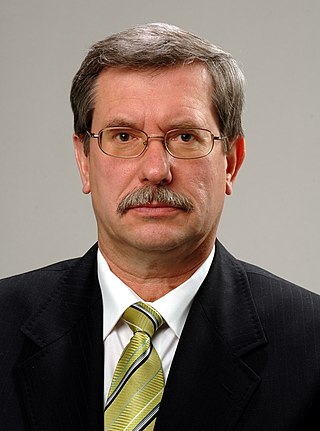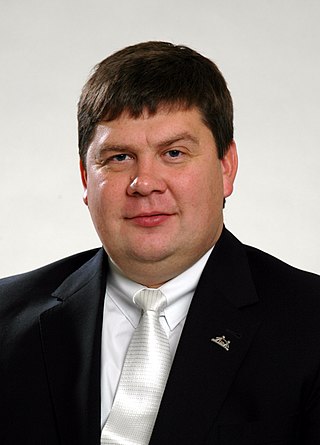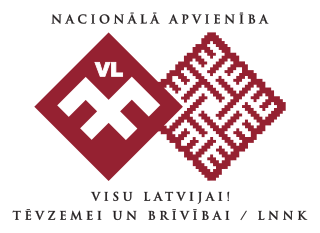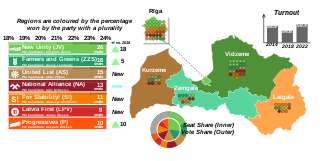
The politics of Latvia takes place in a framework of a parliamentary representative democratic republic, whereby the prime minister is the head of government, and of a multi-party system. The President holds a primarily ceremonial role as Head of State. Executive power is exercised by the government. Legislative power is vested in both the government and parliament, the Saeima. The Judiciary is independent of the executive and the legislature. The Economist Intelligence Unit rated Latvia a "flawed democracy" in 2022.

Einars Repše is a Latvian physicist, financier and politician, chairman of the Association for Latvian Development.

The Estonian Reform Party is a liberal political party in Estonia. The party has been led by Kaja Kallas since 2018. It is colloquially known as the "Squirrel Party", referencing its logo.

The People's Party was a conservative political party in Latvia. The People's Party was the leader of three governments and a member of another four.

Indulis Emsis is a Latvian biologist and politician. He was Prime Minister of Latvia for ten months in 2004, the first Green politician to lead a country in the history of the world. He was Speaker of the Saeima, the Latvian parliament from 2006 to 2007. Emsis' political views are described as rather conservative, unusual for members of green parties around the world.

The CDS – People's Party is a conservative and Christian democratic political party in Portugal. It is characterized as being between the centre-right and right-wing of the political spectrum. In voting ballots, the party's name appears only as the People's Party, with the abbreviation CDS–PP unchanged.

Aigars Kalvītis is a Latvian businessman and a former politician who was the Prime Minister of Latvia from 2004 to 2007. Currently he is the president of Latvian Ice Hockey Federation and the Chairman of the Board of Latvian gas company Latvijas Gāze. He is the Chairman of the Council of Latvian telecommunications company Tet.

The Liberal Party is a social liberal political party in Norway. It was founded in 1884 and is the oldest political party in Norway. It is positioned in the centre on the political spectrum, and it is a liberal party which has over the time enacted reforms such as parliamentarism, freedom of religion, universal suffrage, and state schooling.

Valdis Dombrovskis is a Latvian politician serving as Executive Vice President of the European Commission for An Economy that Works for People since 2019 and European Commissioner for Trade since 2020. He previously served as European Commissioner for Financial Stability, Financial Services and Capital Markets Union from 2016 to 2020 and Prime Minister of Latvia from 2009 to 2014.

Arturs Krišjānis Kariņš is a Latvian American politician who served as the prime minister of Latvia from 2019 until 2023. A linguist and businessman by profession, he previously served as Latvia's minister of Economics and a Member of the European Parliament. Born in Wilmington, Delaware, United States, to parents who had left Latvia during the Soviet occupation, he was active in the American Latvian community throughout his youth.

Ainārs Šlesers is a Latvian business oligarch and politician who was Deputy Prime Minister of Latvia, as well as Deputy Mayor of Riga. Currently he is a member of the Latvian Parliament with his political party, Latvia First, holding 9 seats in the parliament.

Parliamentary elections were held in Latvia on 6 October 2018. Following the elections, a coalition government was formed by Who owns the state?, the New Conservative Party, Development/For!, the National Alliance and New Unity. Despite being from the smallest elected party, Arturs Krišjānis Kariņš of New Unity was chosen as prime minister.
Unity is a liberal-conservative political party in Latvia. It is a member of the New Unity alliance and is positioned on the centre-right on the political spectrum. Since 2017, its chairman of the Main Board has been the former Minister for Economics of Latvia, Arvils Ašeradens, who succeeded former European Commissioner Andris Piebalgs.

The National Alliance, officially the National Alliance "All for Latvia!" – "For Fatherland and Freedom/LNNK", is a national-conservative and right-wing populist political party in Latvia. A right-wing party, it has also been placed as a part of the radical right on the political spectrum.

Māris Kučinskis is a Latvian politician, who served as the prime minister of Latvia, from 2016 to 2019.

The New Unity is a centre-right political alliance in Latvia. Its members are Unity and four other regional parties, and it is orientated towards liberal-conservatism and liberalism.

Jānis Bordāns is a Latvian politician and lawyer, the Deputy Prime Minister and the former Minister of Justice of the Republic of Latvia from 2019 to 2022, and previously from 2012 to 2014.

For Latvia's Development is a classical liberal political party in Latvia. It is positioned on the centre-right on the political spectrum. From 2018 to 2022 it was one of the members of the Development/For! alliance, before it de facto dissolved.

Parliamentary elections were held in Latvia on 1 October 2022, following the end of the term of the 13th Saeima elected in 2018.

The first Krišjānis Kariņš' cabinet was the 40th government of Latvia, sworn in on 23 January 2019 after Krišjānis Kariņš was proposed as Prime Minister by President Raimonds Vējonis and elected by the Saeima and working until 14 December 2022, when Saeima passed a motion of confidence in the Second Kariņš' cabinet.



















